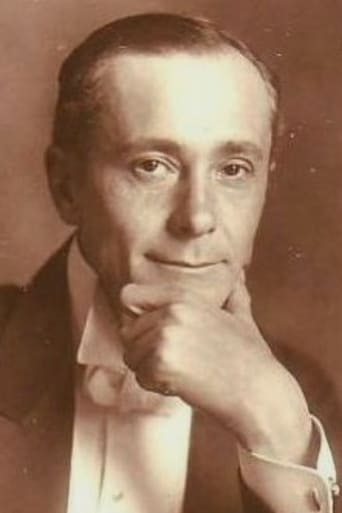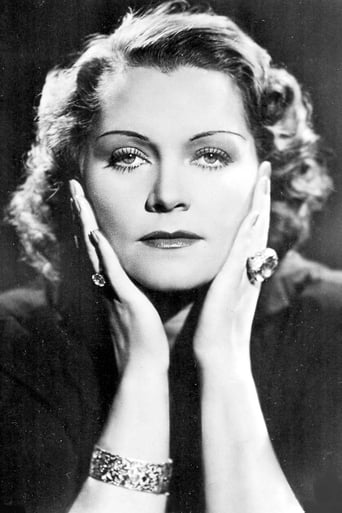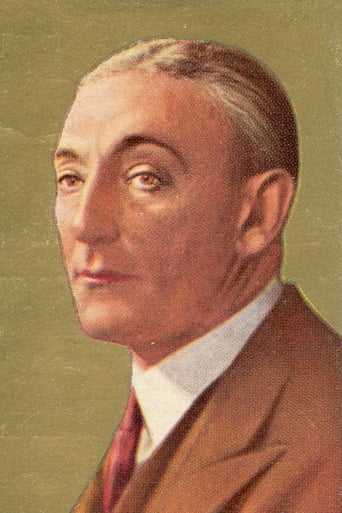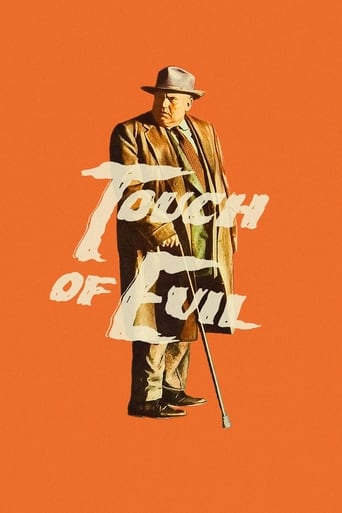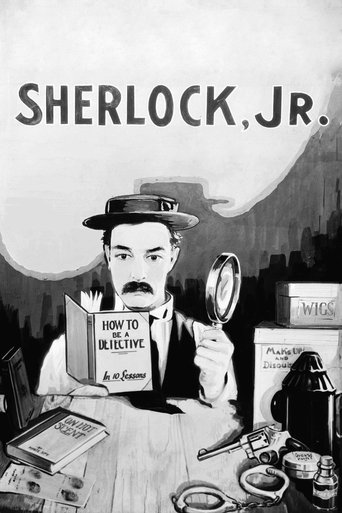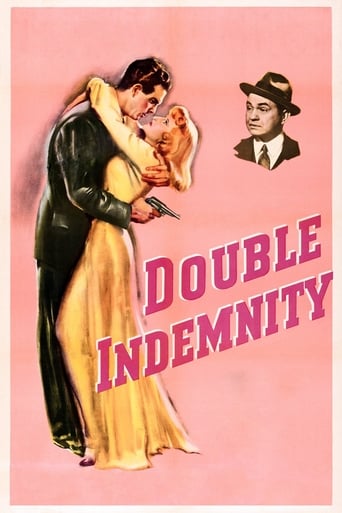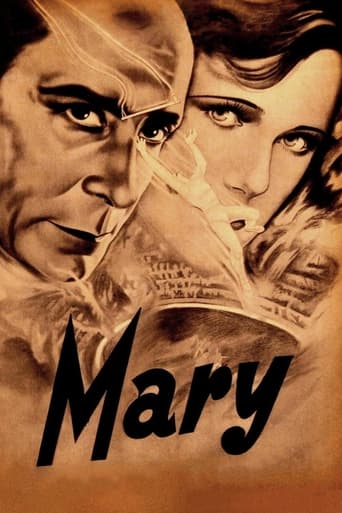
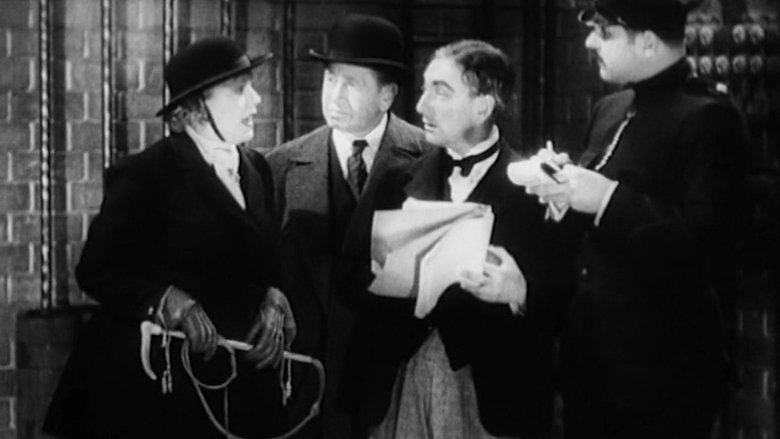
Mary (1931)
A juror in a murder trial, after voting to convict, has second thoughts and begins to investigate on his own before the execution. German version of "Murder."
Watch Trailer
Cast
Similar titles

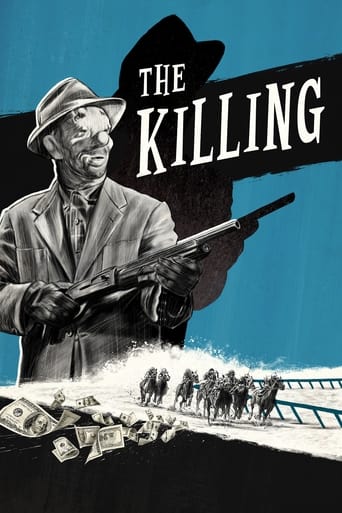
Reviews
To me, this movie is perfection.
This is one of the few movies I've ever seen where the whole audience broke into spontaneous, loud applause a third of the way in.
There is, somehow, an interesting story here, as well as some good acting. There are also some good scenes
One of the worst ways to make a cult movie is to set out to make a cult movie.
I am never entirely decided which out of John Ford and Alfred Hitchcock should be regarded as the most hugely over-rated director of all time. Sometimes I tend one way, sometimes the other.It is not that Hitchcock did not make some very fine films; evidently he did. But he made some rather poor films too, particularly at the beginning and during the long end of his career. And even some of his good films are in doubtful taste and overly reliant on trademark gimmicks. The sycophantic attitude adopted by his admirers (the gullible idolator François Truffaut en tête) bear witness as much as anything to to his dominant personality and extraordinary talents as a self-publicist.Neither the 1930 British version of this film nor the German version (shot simultaneously but only released in 1931) are very good. According to one reviewer the Germans would have liked more changes and this I can well believe. Hitchcock, who had learned most of what he knew from German film-makers really does not take advantage of the opportunity to be more adventurous in his cinematography and mise en scène in the way that marks the films of the great German directors up to this time (a golden age soon alas to be robbed of its glitter by the folly and philistinism of one Herr Hitler). Using German technical skills, he could have made a much superior version of this film.Some changes the Germans did get. The British version is very seriously by the extremely unpleasant racist and homophobic tone of its conclusion (the villain being very clearly marked as a half-caste pansy to be ostracised on both accounts). As, to my astonishment - how protective people are of their icons! - only one reviewer to date seems to have pointed out, these unpleasant elements are removed in the German version. The character still works as an acrobat en travesti but the notion that he is homosexual (derived from the Dane novel) is hardly there at all and his motive for murder is no longer to conceal that he had "black blood" as in the English version (a notion that did not horrify the German public who, even under Hitler and whatever Hitler may have thought of it, gave a hugely warm and enthusiastic welcome to the athlete Jesse Owens five years later as Owens himself would testify sardonically on his return to a segregated USA. In this version Fane is simply an ex-convict wishing to conceal his criminal past.It is easy to read history backwards in the manner of the egregious Siegfried Kracauer and forget that the Weimar period in Germany was in fact notable for its broad-mindedness (films treating homosexuality with sympathy such as Oswald's Anders als die Andern - which is also a plea for a change in the law - Dreyer's Michaêl or Dieterle's Geschlecht in Fesseln simply could not have been made at all in Britain at this time) and its multiculturalism. When the anti-semitic British short-story Saki had imagined a German invasion of Britain in his 1913 novel When William Came, what he feared most was not militarism or autocracy but the spread of a "cosmopolitan" culture (typically a euphemism for "jew" at the time) that would undermine the British identity.Regarding Hitchcock and race, how many African American faces can you recall seeing in all the films that "the Master" made in the US, a period that included the life and death of Martin Luther King, the Civil Right movement, the Johnsonian legislation that transformed US society, the heyday of Mohamed Ali, the Black Panther movement?So these important changes to this film are a reminder that as late as 1931 racism and homophobia that was perfectly acceptable in Britain was considered inappropriate in Germany. Two years later, alas, and both German state and cinema would be in the hands of suicidal and homicidal fanatics. Quel gachis!
For all practical purposes, a remake, in German, of "Murder!" It is stark and frantic, but the plot is the same. The editing is flawed and so things do not move fluidly. Also, the actors seem more stiff and less interesting. It's as if Hitchcock felt he could give the German people a gift, but move on quickly. I agree that the tension is much less. The final scene is one of the most dramatic of any the master produced, but here it doesn't have quite the same impact. See it only if you wish to have a full view of early Hitchcock films. That was my motivation.
A juror in murder trial, decides to go through his own investigation, convinced that the accused (and sentenced) woman is actually innocent.This is the premise of "Mary", Hitchcock's German version of "Murder", a film so rare it's said to have only one surviving copy in the German national archives and the only way to watch it in DVD is to have the French version of Hitchcock's "Jamaica Inn". Well, talk about a good luck, I rented the DVD of "Shadow of a Doubt" and much to my surprise, there was a second one in the box set: "Jamaica Inn". One forgotten Hitch film is an offer you can't refuse, I wouldn't have called myself a fan if I wasn't a little curious to watch it. So I did and well, it was interesting. Once you get past the wooden or theatrical acting from some players, which is typical of many early 30's movie, and a rather excusable flaw (if flaw is the right word), you appreciate the film even more, especially in the way some point-of-view shots or very inspired bits of editing illustrate the then-blooming talent of Alfred Hitchcock. There are two standout sequences though that makes the film all worth to watch, and redeem the lack of appeal of the rest: one taking place at the jury room and one at a circus. I refuse to believe that the jury room sequence didn't inspire, not a bit, the writing of "12 Angry Men", it's the closest to the claustrophobic and psychological vibes that made Reginald Rose' play and the movie adaptation such a thrilling spectacle, and it was two decades before. Now, the second is pure Hitchcock, and it's even funnier to say this, as he was 32 when he made it, but the movie's climax is foreseeing his craze for thrills culminating in the most peculiar and colorful places, here a circus and during a trapeze number. I won't spoil what happens after, except that you don't see it coming no matter how prepared you are to see it coming. I was bluffed and shocked, and I liked the way it was both dark and emotionally rewarding. I supposed the original would have been more enjoyable, because the German performances, the subtitles, and the rather blurry quality of the black-and-white photography make some part difficult to follow, also the fact that many characters look exactly alike, with the same bourgeois demeanor, same slick hair and dark clothes that I wondered if it wast a deliberate attempt to confuse us, but for what reason? Maybe Hitch wanted to emphasize the fact that any of the protagonists could be the real killer or maybe it was an aesthetic choice, or maybe I'm reading too much and it was just a pure coincidence. Anyway, this isn't exactly where the film sins. While it was very economical and never wasted lines or scenes, there were a few scenes or lines too many even for its eighty minutes. First, we didn't really need the last shot because as soon as the innocence is proved, the sight of the innocent woman leaving prison and being comforted doesn't add much to the story, we already know justice has been done. Another missed opportunity was with the motive of the murder, all through the film, the one question left unanswered was "what was the victim about to reveal about the man (likely, the murderer) so that she had to be killed?". We know there's a secret to reveal, it's a mystery that remains unsolved but whose necessity plot-wise is lost when it has served its purpose, which is to unmask the real killer. Once justice is done, of course, we want to know the secret, and one of the protagonists asks the question, but seriously, would have any answer been as satisfying as having good old Hitch making a smash cut before we know? I know he wasn't "good old Hitch" then, but it would have been a brilliant hint of his wicked humor to leave the secret hidden and having kept it as a MacGuffin. So many film come very close to being modest masterpieces thanks to some clever endings, original in a cunning, if not cynical, way. Hitch had all the material to close "Mary" in a very Hitchcockian way, but I guess it took him a few conventional films to make his bones before making unconventional ones. Four year later, he'd make "39 Steps", which are like giant leaps from "Mary", still a good film to watch for all the fans of Hitchcock.
This perfunctory German version of MURDER, filmed at the same time on the same sets but with a mostly different cast, is 28 minutes shorter than the English version! It leaves out all of the touches that make the English version enjoyable, and also leaves out some of the clues that lead to the murderer. Some of the things left out are: the jury member who hasn't a clue; the jury foreman having difficulty getting the ballots in the right piles; the jury filing out from the jury room into the court and Sir John waiting before getting up and joining them; the servant bringing the radio into the bathroom, and the colloquy with the servant at that point; the interior monologue is much shorter; dialogue in the scene immediately after is shorter (also, the bathroom and subsequent scene are sequenced wrong so that it seems he's shaving again after he finished); the landlady isn't present when the couple get the call from Sir John, and so the byplay about them owing the rent is not there; their frantic dressing and spiffing up for the Sir John visit; the shot of the stage manager's feet in a super-soft carpet, showing what it feels like to him; the scene where they look at the parlor with landlady is much shorter (and comes after scene where they look at her bedroom); tricking the landlady by using a high-pitched voice; Hitchcock's appearance in the street; tipping the theatre manager after they inspect the theatre; the scene with all the kids is much shorter, with the cat under the covers eliminated (same kids, though); the kids don't sit on the trunk, so the dialogue about the policeman's uniform in the trunk must not be there; the striking overhead shot of Mary in her cell, and the shadow of the noose; Sir John's scene with Mary is shorter, colder, and they don't talk about the theatre at the end; the scene of Sir John and the stage manager in the circus audience, where they talk about trapping the murderer with a Hamlet-like play is much shorter; when the murderer hangs himself, there's a somewhat more dramatic sound editing, perhaps to cover up the fact that he doesn't make a very good noose; the murderer carried out on a stretcher; the sequence of Sir John and Mary in the train is shorter; and the shot of the characters on stage at the end. Some of the jokes are still there but presented in so rudimentary a fashion that one would hardly notice. For example, when Sir John notices that his guest is using a small spoon for the soup, he does the same, and when he puts his martini olive on the tray, the guests don't know what to do with theirs; both these incidents still occur but with no reactions from the actors to point up the gags. Abel looks a lot like Marshall, which is very disconcerting because that British upper-class attitude that informs every aspect of the English version is completely lacking. The stage manager is an expressionless nonentity in this version. It's a second-hand, second-rate copy all through. One can hardly believe Hitchcock himself directed this totally lacking, colorless run-through of his delightful MURDER. You may never get a chance to see this one, which may frustrate Hitchcock completists, but, really, there's absolutely no reason to see it, even if you only understand German! See MURDER a second time instead.
